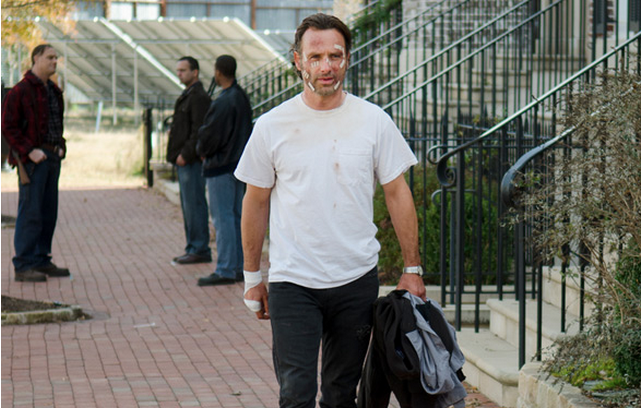TWD offers a harsh view of the world. It is not, as most people think, about preparing to survive an imagined future apocalypse. It is a morality tale about navigating life as it is RIGHT NOW.
It is a show that knows its own significance.
* Takes itself as an object to be discussed — “The Talking Dead” aftershow.
* Offers platforms for strangers to experience the show together, on Twitter and through the show’s “two-screen experience” on TheWalkingDead.com.
* Sells “the experience” to consumers through a wide variety of commercial products.
People talk about TWD anyway. On social media and off. It is widely parodied and copied.
It has become an important social text.
Why?
Among many other things it offers us a way to talk about leadership.
There is a clear model here of right and wrong, epitomized by the main character Rick, a sheriff by training and he plays this type of character in the show.
The top 10 aspects of Rick’s leadership style:
1. He leads with the consent of the group. When he is wrong they talk to him frankly. When he is out of control they remove him from play, physically, and he accepts that.
2. He tells the truth. When he lies he admits it. When he makes a mistake he says so.
3. He will kill if necessary. He will bite the neck off a man if it means saving his son from getting raped. He will kill a husband if it means saving his wife from getting her head bashed in.
4. He is motivated by the welfare of the group. Initially he thinks of the group as his family, then expands this circle to include fellow travelers who have fought alongside him. Eventually he grows to take responsibility for a community.
5. His decisions are based on practical need. He does not live by any ideology.
6. He knows how to prioritize. First comes taking care of his family, then survival, and then helping others learn how to survive.
7. He has limits. He will not hurt others any more than he has to.
8. The only people he hates are those who take advantage of the weak.
9. He doesn’t discriminate against anyone.
10. He is ultimately human, flawed, tempted, tormented, and he does snap at times.
Interestingly there are more extreme characters in the group – most notably Carol, who survived brutal domestic abuse by her husband. She has become very tough, very crafty and very strategic but her wounds have pushed her into a kind of coldness that can be chilling.
There are milder characters who can handle themselves in a fight, like Glenn. But when another character tries to kill him, Glenn backs away from finishing him off.
The other leaders we’ve encountered on the road include an evil character, The Governor, who rules by fiat and deception. He and Rick become moral enemies.
In contrast, Rick finds kinship with a Senator type who embodies what she calls “transparency,” diplomacy and communal ideals.
This last season has been a searching discussion between the two characters.
They question: Is community possible?
And they answer, each in different ways, “Yes but you have to know when, where and how to draw the line.”
By the end of this season, they found a shared meaning of that line, and a shared framework for the answer.
# # #
Screenshot source: Season 5 TWD finale, via AMCTV.com. All opinions expressed are Dr. Blumenthal’s alone, and do not reflect the views of the U.S. National Institute of Standards and Technology or the U.S. government.





Leave a Reply
You must be logged in to post a comment.